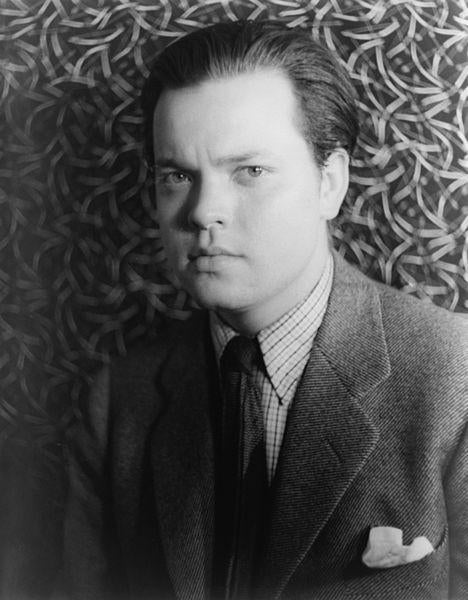Via the Millions, and just in time for Halloween, comes this charming clip of a conversation between Orson Welles and H.G. Wells. The two were and are linked in the public imagination thanks to The War of The Worlds, a sci-fi novel published in 1898 by Wells and adapted 40 years later by Welles as a radio drama broadcast on Halloween, 1938. (The two are also linked by the similarities in their names: “I’ve had a series of the most delightful experiences since I came to America,” Wells, who was English, says, “but the best thing that has happened so far is meeting my little namesake here, Orson.”)
Their meeting was fortuitous: Both happened to be in San Antonio, Texas, just before Halloween, 1940, two years after Welles adapted Wells’s novel. KTSA, a local radio station, brought them into their studio for an interview.
Wells—whom the radio host, Charles C. Shaw, introduces as, “in the opinion of many, the world’s most famous man of letters”—was in town “to address the United States Brewers Association.” Welles was there to deliver “a town hall forum address.” Shaw asked them to speak about the radio drama, which became notorious after many people listening believed it was not a radio drama at all but a news report. In the novel, Martians invade London; in the radio drama, they invade the United States—and Welles, together with his Mercury Theatre team, presented the story as a series of “news bulletins” interrupting another program to inform listeners of the horrible breaking news.
H.G. Wells begins his brief remarks on the affair with a question: “Are you sure there was such a panic in America or wasn’t it your Halloween fun?” Welles is cheered by this comment. “I think that’s the nicest thing that a man from England could possibly say about the man from Mars,” he says. He then mentions the comments of Adolph Hitler, who claimed that the panic proved the decadence of democracies. “I think it’s very nice,” Welles continues, “for Mr. Wells to say not only I didn’t mean it, but the American people didn’t mean it.” “You aren’t quite serious in America, yet,” Wells responds. “You haven’t got the war right under your chins. And the consequence is you can still play with ideas of terror and conflict.”
As it happens, Wells may have been right about the reaction to Welles’s famous radio play. Over the weekend, the BBC published a piece on their website by journalism professor W. Joseph Campbell arguing that the story of the War of the Worlds panic has always been exaggerated—and that newspapers may have been inclined to hype the panic as a way of discrediting radio. (Campbell included a chapter about the incident in his 2010 book, Getting It Wrong: Ten of the Greatest Misreported Stories in American Journalism.) The Chronicle of Higher Education published a piece on the subject (subscription required) in 2008.
The conversation ends on a lighter note. “Before we get away from this microphone,” Wells says, “tell me about this film of yours that you’ve been producing.” “This is of course the kindest and most gracious thing to do,” Welles replies. “Mr. Wells is making it possible for me to do what is spoken of in America as a plug.” “It’s a new sort of motion picture,” he adds. “If I don’t misunderstand you completely,” Wells says, “I think there will be a lot of jolly good new noises in it.” “I hope so,” Welles responds.
